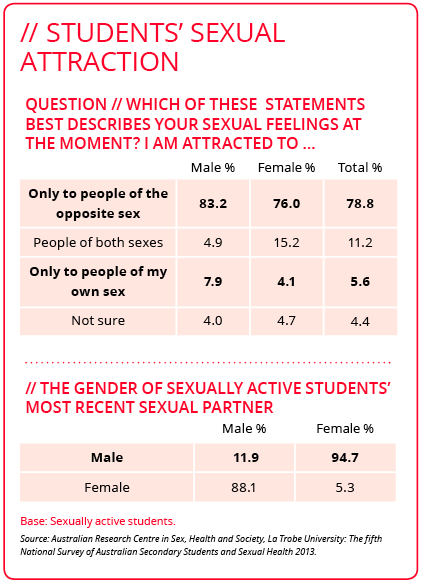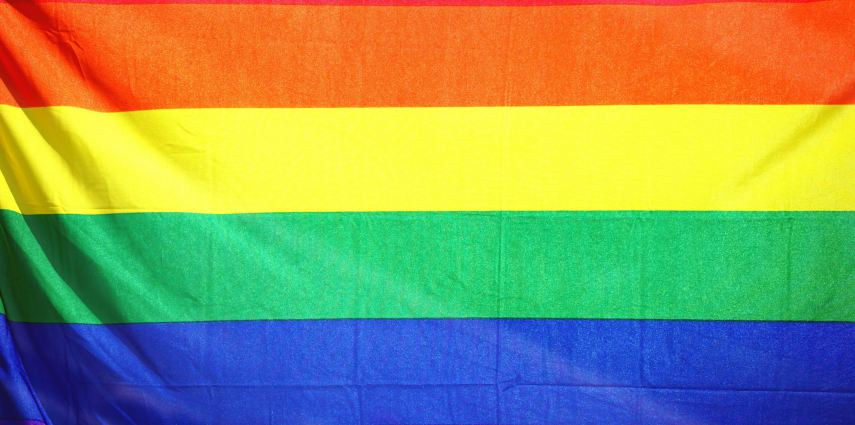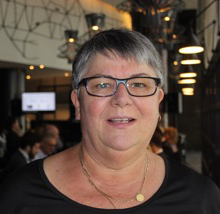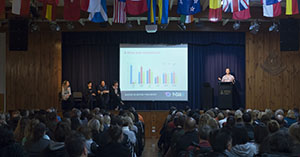
Source: Parent Guides
Family support for same-sex attracted and gender diverse young people is important.
It is important for parents to support their children regardless of their sexuality or gender identity. The LGBTIQ (lesbian, gay, bisexual, transgender, intersex and questioning) community is diverse.
Data presented in the Safe Schools Coalition’s All of Us teaching resource reveals that Australian and international research had found that about 10 per cent of people are same-sex attracted, about four per cent are gender diverse or transgender, and about 1.7 per cent are intersex.
Three in four same-sex attracted young people experience some form of homophobic abuse or bullying and gender diverse and transgender young people face discrimination that results in negative health and well-being.
Eighty per cent of this abuse and bullying occurs at school. Research has also found that the homophobia experienced by same-sex attracted young people has a direct impact on their academic engagement and achievement, including missing classes or days at school and dropping out altogether.
At schools with active policies against homophobic abuse, students were less likely to have poor mental health and significantly less likely to experience homophobic violence and well-being risks such as self-harm and suicide.
For parents, educating young people about sexuality and gender identity in a non-judgemental way can help them feel more comfortable with who they are. It is also helpful to role model inclusive language and behaviours.
Understanding the terms:
Gender diverse // People whose gender expression or identity differs from the gender identity associated with the sex assigned them at birth or society’s expectations …
Gender identity // Gender identity refers to a person’s sense of being masculine or feminine, or both or neither …
Heterosexism // Views or behaviours that assume everyone is, or should be, heterosexual and that other types of sexuality or gender identity are unnatural or not as good as being heterosexual …
Intersex // People who are born with natural variations in genital, chromosomal or other physical characteristics that differ from stereotypical ideas about what it means to be female or male. Intersex refers to biology rather than sexual orientation or gender identity …
Same-sex attracted // People who experience feelings of sexual and/or emotional attraction to others of the same sex …
Sistergirls and Brotherboys // Aboriginal, Torres Strait Islander and South Sea Islander communities use various terminology to describe or identify a person assigned female or male at birth and identifying or living partly or fully as another gender …
Transgender // An umbrella term used to describe people whose gender identity is different from the sex assigned to them at birth. An example is a child who is assigned a male sex at birth but actually feels more comfortable living as a girl and identifies as female …
For more information visit www.safeschoolshub.edu.au/common/downloads/Safe-Schools-Do-Better_2015.pdf
Real teen’s perspectives
Liam // 17 // straight
How do you identify in terms of gender and sexuality?
I identify as a straight male.
Have you ever felt confused or unsure about your sexuality?
When I was about 14 I thought it was possible that I might be bisexual, but those feelings were gone within about a year.
How did this make you feel?
I was extremely worried because I wanted to live a normal life with a woman and have a normal family.
It felt as if you were somehow ‘less’ of a man if you were bisexual?
Yeah. There’s a pressure for blokes to be tough and manly, and for someone to be gay or bisexual would erase that whole ego.
Did you talk to friends or family about this?
I spoke to my mum and she gave me total support and either way I chose was fine. I told my best friend at the time, she was very supportive also; told me she wouldn’t care either way.
Were you able to discuss these feelings with any male friends?
Yeah, after awhile I told a couple of close mates, people I really trusted, and they were completely cool. It was a relief.
Would you have considered talking to your dad about it?
No, I don’t reckon he would have coped at all.
Tori // 19 // lesbian
When did you first begin to identify as lesbian?
When I was in prep I tried to look like a boy to make the girls like me. In grade 5, I had a crush on a girl in my class. In year 7, I discovered the names for different sexual orientations and that’s when I realised that I mightn’t be straight.
Was it confronting to realise you weren’t heterosexual?
I found it very difficult to accept. The first person I told was my best friend at the time. After I told her she said she didn’t feel comfortable with me staying over [at her house] any more. So I told her I was joking. I thought that if that’s how my best friend reacted there was no way anybody else would accept it. I denied being a lesbian for the next four years. I kissed boys to fit in; but I knew I wasn’t sexually attracted to males.
Did you get support during this time?
The best support was my dad being OK with it. Then I felt as though I was free, I suppose, to work it all out myself.
How did your mum react?
We were already arguing and I… said it knowing it [would] upset her. She threatened to call the police and have them throw me out. Mum took my belongings to my dad’s and left them out in the rain.
Have things improved at all?
My girlfriend and I have been together for 15 months. She’s been coming to family events on my mum’s side for a couple of months now, which is progress!
Kaiden // 16 // queer
You identify as pansexual and gender queer. How does your school support your choices?
My school is quite supportive. I’m able to wear the uniform I feel comfortable in. There’s a unisex toilet and plans for more.
Who have you discussed your gender and sexuality with?
So far I’ve only told my mum. At first she didn’t believe me. She said it was a phase, or that I’d grow out of it, which hurt a lot, but she has now come around and is very supportive. My friends have also been understanding and very supportive.
Have you received support from any organisations?
I got help at Headspace, and I met a lot of people going through similar things as me at Minus 18. Both places provide safe places to hang out and resources, so mum and I can learn more.
When did you first experience confusion about your sexuality and gender?
I first started questioning my sexuality about four years ago, and my gender a little under two years ago.
Do people find your gender identity confusing at times?
Sometimes, but when I explain it most people get it. It doesn’t bother me too much when people get confused, except when they refuse to accept that being pansexual is a real thing.
Pearl // 16 // Bisexual
Are you comfortable being open about your sexuality?
I’m pretty shy when it comes to being out as a bisexual woman, but I’m open about it with my close friends. People are aware of it but I prefer to keep most of it to myself.
What sort of responses have you had when you’ve shared your orientation?
People reacted really well when I told them, most of my friends were just interested in it and had a lot of questions. My mum listened to me and told me it changed nothing, and we haven’t really talked much about it since.
Have you faced any negativity?
Some slight bullying, but most of it was minor and I was able to ignore it and realise how much happier I was [being honest].
What was your own reaction when you first became aware of your sexual preference?
When I was 15 I realised that I felt a lot more than friendship for my best friend, which was strange because I never thought that I would be any different from the straight girls that I grew up with.
How does it affect you now?
Being bisexual has no impact on my life at the moment. To me it’s no different than anyone else’s orientation. I’ve had more relationships with males, because I didn’t realise I felt the same about girls as boys until recently, but I’ve had relationships with females too.
Are you more attracted to other bisexuals?
No one’s orientation has any effect on how I see them. Everyone is different and we like who we like.
Kate // 18 // queer
Can you explain your sexual and gender identities?
Pansexual is my sexuality, whereas gender queer is my gender identity. With pansexuality, I’m attracted to people, not gender. Of course I have my preference for partners (male and transgender male) but I fall for whomever I fall for. I identify as both genders depending on how I feel. It’s very fluid.
When did you first notice this fluidity?
I realised when I was about five that I didn’t want to be entirely female, but I didn’t know what it really was at that age. I started identifying as gender queer when I was 13 or 14. There have been stages in my life where I have thought I was transgender and wanted to go on hormones and transition to male.
What stopped you going ahead with that?
I realised I didn’t want to live my life fully as a male. I still love makeup, dresses and girly things, as well as dressing male.
Has your search for sexual identity had any effect on your well-being?
I did go through four years of very bad mental health, including self-harm and suicide attempts. I went through two years of wanting to transition to male.
Did you have support from your family and friends?
I was very scared to come out to my mum because she’s always been quite conservative, but after I told her it was all support. My dad has definitely been the most supportive and I came out to him first. My friends have always given me support and help.
Marcus // 19 // Gay
How would you describe your experience of coming out?
Such an anticlimax! After expecting the world to cave in, it was actually no big deal, and I was super thankful for that. I told my best mate at the time, and he was fine.
When did you first begin to recognise that you might be homosexual?
At puberty, when I was about 12 or 13. I totally freaked out. It was really hard to accept that things were going to be different for me. I thought I would get married and have kids.
Was your mental health affected?
Absolutely. I became more and more depressed and desperately tried to think of ways that I could possibly change my orientation. I was self-harming at this stage.
What helped you get through it?
I think I’m lucky to have been born at a time when people can live openly. Seeing older gay men leading successful lives really helped. I also went to super lame gay dance parties at Minus 18 and just loved it.
Was it difficult telling your family?
I was so worried that I would disappoint them. Family is the most important thing to me and to lose that would be devastating. When I did tell them, when I was 13, it was such
a relief that I could be myself around them.
How did they react?
Initially they had their doubts that it might have been a phase, and I can understand where they were coming from. But soon they were like: “When are you going to bring a boy around?”.




